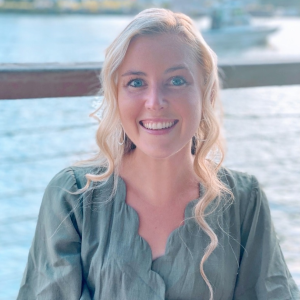Colleen Carroll looked at a pile of knitting yarn and thought of the hands that held it before her. The yarn was gifted to her by a terminal cancer patient whose symptoms prevented her from enjoying her favorite hobby. Now, the young nurse was mourning her patient’s passing and thought, “Maybe we can’t prevent the death, but how can we prevent the suffering?”
The seemingly small moment would have a transformational impact on Carroll’s career.
Carroll is the inaugural recipient of the Derry Ann Moritz Scholarship, which supports PhD candidates at the Frances Payne Bolton School of Nursing whose dissertations focus on topics surrounding palliative and end-of-life care.
Through her estate, Moritz (NUR ‘58) established the full-tuition scholarship in honor of her friend Barbara Daly, PhD, RN (NUR ‘72), a Case Western Reserve Distinguished University Professor Emerita and an emerita faculty member with the School of Nursing whose life’s work has focused on addressing the unique challenges that come with treating critically and chronically ill patients, particularly those with cancer.
Moritz, who died in 2017, met Daly on the faculty of University of Massachusetts Amherst College of Nursing and was motivated by her own experience working in hospice to conduct research on the emotional toll of death on hospice care workers.
Terminal illness and hospice care can be uncomfortable topics, and work surrounding them often is underfunded or ignored. But, like Moritz and Daly, Carroll is passionate about making the experience easier for critically ill patients and their loved ones.
An oncology palliative care nurse practitioner at University Hospitals Seidman Cancer Center since 2022, Carroll was looking for opportunities to elevate her experience in the field.
Last year, she had the opportunity to be the primary author of a medical manuscript. Toward the end of the writing process, Carroll connected with Susan Mazanec, PhD, RN, a nurse scientist at University Hospitals Seidman Cancer Center and an associate professor at the School of Nursing. “She was so gracious and helpful,” said Carroll, recalling the numerous rounds of feedback Mazanec provided on the manuscript. “While it was humbling, I loved each step.”
Carroll and Mazanec stayed in touch, and Mazanec ended up recommending Carroll for the Moritz Scholarship. “When this opportunity came, and I realized these are the kind of mentors I could learn from, it felt like an opportunity that was far too good to pass up,” said Carroll.
Carroll is thankful for the unique opportunity to pursue this research and clinical experience with faculty members like Mazanec. “I get to earn a PhD from this world-renowned university and nursing school,” she said, “which is something I never would have thought possible.”


